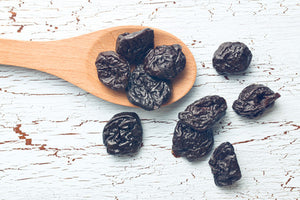Can Prunes Help Your Improve Intestinal Health?
December 05, 2016

Generations of people have been eating dried plums, also known as prunes, to prevent constipation. A new scientific study shows prunes can positively affect the bacteria living in the gut and may even reduce the risk of colon cancer.
Colon cancer is the third leading cause of cancer-related death among men and women in the United States, according to the American Cancer Society, claiming an estimated 49,190 lives in 2016. While advanced treatments improve the likelihood of survival, prevention is key to lowering mortality rates.
About the Bacteria Living in Your Intestines
There are trillions of bacteria living in the human gut, known collectively as the gut microbiota. While some of these bacteria cause illness and disease, many others are beneficial. These beneficial bacteria, known as probiotics, help control the population of harmful bacteria in the gut, improve digestion and absorption of nutrients, and even bolster the immune system.
Previous studies have shown that some of the bacteria in the gut are involved in the onset of intestinal inflammation and that recurring inflammation in the gut can promote the development of colon cancer. Knowing this, the researchers wanted to test if they could positively influence the gut microbiota in a way that might reduce inflammation and ultimately cancer.
Dried Plums Modify Microbiota Populations in a Way that May Protect Against Colon Cancer
Researchers from Texas A&M University and the University of North Carolina wanted to determine whether eating prunes helped establish and maintain healthy levels of bacteria in the gut. The scientists fed a test group of 26 laboratory rats a diet that included prunes and fed the control group of 25 rats the same diet without the prunes. Except for the prunes, the calories, and nutrients of the diets fed to the two study groups were identical; this ensures that any effects are attributable to the presence of the prunes in the diet.
The scientists then examined the intestinal contents and tissues gathered from different segments of the colon. They made two important discoveries.
First, they discovered that the prune diet changed the levels of two major phyla bacteria living in the gut of the rats. Specifically, the researchers found increased levels of Bacteroidetes in the last part of the large intestine, known as the distal colon, and lower levels of Firmicutes compared to the control group.
Furthermore, the rats that consumed prunes experienced fewer intestinal lesions and abnormalities associated with cancer compared with the rats in the control group. Specifically, these abnormalities include clusters of abnormal glands that appear in the lining of the colon and rectum. These glands can be precursors to cancer, meaning their presence can be a strong indicator for the development of cancer, as they are often the earliest observable precancerous lesions.
The researchers concluded that consuming prunes appear to help the body retain beneficial bacteria and microbial metabolism in the colon.
Dr. Nancy Turner is the lead author of the study and is an AgriLife Research professor in the nutrition and food science department of Texas A&M University, College Station. In a press release, Turner says, “Through our research, we were able to show that dried plums promote retention of beneficial bacteria throughout the colon, and by doing so they may reduce the risk of colon cancer.”
Funded by the California Dried Plum Board, the researchers presented their research findings at the Experimental Biology conference in Boston.
While additional research is necessary, especially human studies, results from this study excite the scientific world – and consumers – because it suggests that regular consumption of prunes may be one strategy for reducing the risk of colon cancer. As always, these ideas do best when applied with a holistic view to self-care that also includes consuming a healthy and balanced diet, getting regular exercise and caring for your own internal microbial eco-system.
The post Can Prunes Help Your Improve Intestinal Health? appeared first on Natren Probiotics Blog.




Leave a comment